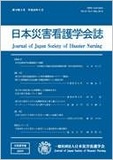Japanese
English
- 有料閲覧
- Abstract 文献概要
- 参考文献 Reference
- サイト内被引用 Cited by
【要約】
[目的]本研究は、日本在住外国人の災害への備えの認識と公助の現状を明らかにして支援への課題を見出すことを目的とした。
[方法]外国人への公助の現状を明らかにするため、自治体ホームページの情報を質的に分析し、日本在住外国人5名に自助の備えの認識について半構成的面接を実施した。[結果]日本在住外国人の語りから、17のカテゴリーが抽出され『外国人にとっての災害への備えの項目』『備えられない理由』『備えるために必要なもの』が明らかとなった。項目は日本人と同様であるが、備えられない背景には文化的要因が見られた。公助の現状と外国人の認識から、情報とニーズのギャップ、教育と協力者の不足、公助への依存が備えの障壁で、必要な支援として、言葉に配慮した情報提供、継続的な教育の提供、ネットワークの構築、自治体や外国人支援団体との連携が示唆された。
[結論]外国人の考える自助の備えは日本人と同じであったが、備えられない背景には文化の違いがあった。外国人の特性に配慮した情報提供、教育、ネットワークと連携が自助の促進に必要である。
Purpose: This study aimed to examine perspectives on disaster preparedness of foreigners living in Japan and to clarify the availability of public support.
Methods: Information from local government websites was analyzed in order to assess public support for foreign residents. In addition, semi-structured interviews were conducted with five foreigners living in Japan to assess their perspectives on disaster preparedness.
Results: Seventeen categories including “Items for disaster preparedness for foreigners,” “Reasons not to prepare” and “Requirements for preparedness” were extracted from the narratives of foreigners. The items for preparedness were similar to those of Japanese, and cultural factors were found to be related to their reasons not to prepare. From the results, barriers to preparedness are the gap between information and needs, a lack of education and cooperators, and dependence on public support. The findings suggest that information considering language, continuous education, building networks and cooperation among stakeholders are necessary to improve self-help by foreigners.
Conclusion: Foreigners recognize disaster preparedness just as Japanese do, but cultural factors are related to the reasons they cannot prepare. Information, education, networking and cooperation considering the characteristics of foreigners are needed for improvement of self-help.
Copyright © 2018, Japan Society of Disaster Nursing All rights reserved.


